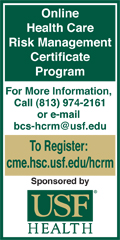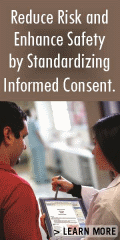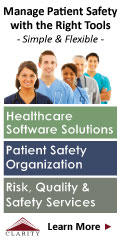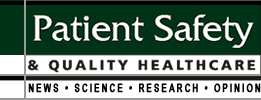 |
 |
 |

September / October 2005

View from the Hill
What Does the New Patient Safety Law Mean?
By David W. Roberts, MPA, FHIMSS
Usually, summer is a time for folks in Washington, D.C., to flee town and enjoy cool weather outside the Capitol Beltway. This summer has been anything but usual.
At 10:09 a.m. on Friday, July 29, in Room 450 of the Eisenhower Executive Office Building, President George W. Bush signed into law the Patient Safety and Quality Improvement Act, S. 544, which will create a national patient safety database to encourage voluntary reporting of medical errors. At this signing ceremony, the president said that "this bill is a critical step toward our goal of ensuring top-quality, patient-driven healthcare for all Americans... With this law, we'll be able to obtain more accurate information about medical treatments. And by providing doctors with information about what treatments work and what treatments cause problems, we will reduce medical errors that injure and cause the deaths of thousands of Americans each year."
According to the president, "The Patient Safety and Quality Improvement Act will help ensure that Americans continue to benefit from the greatest medical system in the world. To maintain the highest standards of care, doctors and nurses must be able to exchange information about problems and solutions. Yet in recent years, many doctors have grown afraid to discuss their practices because they worry that the information they provide will be used against them in a lawsuit. This bill will help solve that problem. This is a common-sense law that gives legal protections to health professionals who report their practices to patient safety organizations. By providing critical information about medical procedures, doctors and nurses can help others learn from their experiences. That's why I said it's a common-sense law. By making essential information more available across America, we will help ensure that patients benefit from the best medical treatment, no matter where they live. That seems to make sense to me."
Chip Kahn, president of the Federation of American Hospitals, said that the law "will remove legal roadblocks, thereby allowing healthcare providers to focus upon solving problems rather than worrying about lawsuits." So what is this new law, S. 544, and what does it mean for improving patient safety?
S. 544 actually traces its history to the non-partisan Institute of Medicine (IOM) report To Err Is Human: Building A Safer Health System, which was released on November 1, 1999, and found that "the human cost of medical errors is high. Based on the findings of one major study, medical errors kill some 44,000 people in U.S. hospitals each year. Another study puts the number much higher, at 98,000. Even using the lower estimate, more people die from medical mistakes each year than from highway accidents, breast cancer, or AIDS."
Even with this headline grabbing study, it took years to draft legislation that received broad bi-partisan balance to promote medical error disclosure without prompting more litigation. S. 544 was first submitted in the 108th Congress by Senator James M. Jeffords (I-VT) and it passed the U.S. Senate, but not the U.S. House of Representatives. Because this legislation was not passed by both houses by the end of the 108th Congress, it died and needed to be reintroduced in the 109th Congress, which took office in January 2005.
Senator Jeffords did just that on March 8, 2005, when he reintroduced S. 544. The legislation was referred to the Senate Committee on Health, Education, Labor, and Pensions (HELP), and on March 9, the HELP Committee ordered it to be reported without amendment favorably. Original co-sponsors of this legislation were: Senators Jeff Bingaman (D-NM), Mike Enzi (R-WY), Judd Gregg (R-NH), Mary Landrieu (D-LA), Jeff Sessions (R-AL), Susan Collins (R-ME), Bill Frist (R-TN), and Patty Murray (D-WA). Senator Edward Kennedy (D-MA) co-sponsored this legislation on July 21 as the 9th co-sponsor.
On July 21, the Senate HELP Committee unanimously passed this legislation and immediately took it to the full Senate for consideration. Senator Mike Enzi (R-WY) worked to gain bi-partisan support and offered a substitute amendment that passed the U.S. Senate that same day by unanimous consent.
Following passage by the Senate, the legislation was referred to the U.S. House of Representatives where it was referred to the House Committee on Energy & Commerce. On July 27, Rep. Nathan Deal, chairman of the House Energy & Commerce Health Subcommittee, ordered the House rules to be suspended and immediately called for a full House vote on the legislation, which passed 428-3.
Specifically, S. 544 removes the "culture of blame" and lets stakeholders truly focus on improving patient care by learning from medical errors. In order to accomplish this goal, the legislation begins by defining the following terms:
- HIPAA confidentiality regulations

- Identifiable patient safety work product

- Non-identifiable patient safety work product

- Patient Safety Organization

- Patient safety activities

- Patient safety evaluation system

- Patient safety work product

- Provider
Next, the legislation says that patient safety work products will be privileged and not:
- Subject to federal, state or local civil, criminal or administrative subpoena

- Subject to discovery

- Subject to disclosure

- Admitted as evidence

- Admitted in a professional disciplinary proceeding
The only two primary exceptions cited in the law from privilege and confidentiality are (1) for use in a criminal proceeding after a court makes a determination that a patient safety work product contains evidence of a criminal act and (2) if authorized by the provider.
The legislation authorizes the Secretary of Health and Human Services to facilitate the "creation of, and maintain, a network of patient safety databases that provides an interactive evidence-based management resource for providers, patient safety organizations, and other entities. The network shall have the capacity to accept, aggregate across the network, and analyze non-identifiable patient safety work product voluntarily reported by patient safety organizations, providers, and other entities." Information that is reported to these new databases will be used to analyze national and regional statistics, including trends and patterns of healthcare errors.
The remainder of the legislation focuses on Patient Safety Organization certification and listing.
So what has been the reaction to this new patient safety legislation? Well, J. Edward Hill, president of the American Medical Association, said the law is "the catalyst we need to transform the current culture of blame and punishment into one of open communication and prevention." He added, "Future errors can be avoided as we learn from past mistakes. This law strikes the proper balance between confidentiality and the need to ensure responsibility throughout the healthcare system."
However, some feel that the law does not guarantee that providers will report their mistakes and others have criticized the legislation for failing to include federal penalties for mistakes. Margaret Van Amringe, vice president for Public Policy and Government Relations for the Joint Commission on Accreditation of Healthcare Organizations, is one of the few officials who has been publicly quoted as saying that "there's no incentive to report useful information if you know it is going to be used against you. If you don't have the information then you are not going to solve the problem." The legislation also does not define what a medical error even is.
In his concluding remarks at the July 29th signing ceremony, President Bush said, "We'll continue working to improve our health care system . . . to reduce costs and improve care, (and) we must harness the power of information technology to computerize health records." This column will keep you posted as new developments occur.
David W. Roberts, MPA, FHIMSS, is HIMSS vice president for government relations. Formerly a professional staff member for both the U.S House Appropriations Committee and the U.S. Senate Health Subcommittee on the Handicapped, and a civilian financial analyst for the U.S. Air Force, Roberts now resides with his family in Solana Beach, California, where he is an elected member of the City Council and maintains a HIMSS office in Alexandria, Virginia.
|
 |
 |
 |


















|
 |

